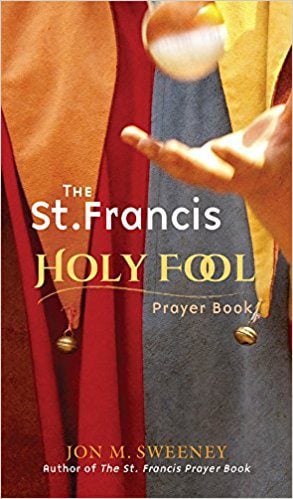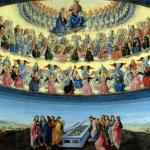Today’s post is by a guest contributor: Jon M. Sweeney, author of numerous books including The Saint Francis Holy Fool Prayer Book.
 I’ll always remember the day I decided to introduce my daughter to one of my favorite movies, Singing in the Rain.
I’ll always remember the day I decided to introduce my daughter to one of my favorite movies, Singing in the Rain.
We sat and watched it together on the couch. She didn’t wiggle much and laughed at the right places. But then we got to the title song and dance number and there was Gene Kelly, blissfully enjoying a rainstorm. You remember how he runs back and forth across a city street at nighttime in the pouring rain, singing at the top of his lungs, tap-dancing by stomping in puddles, grinning at a cop on patrol, becoming drenched in his business clothes. He’s wearing a suit—and even gives away his umbrella!
As we watched I laughed out loud and was grinning ear to ear. That’s what I do when I watch that scene. My daughter watched carefully, and was smiling, but to my surprise, she said, “That’s kind of stupid, Dad.”
She was only four years old, but I was sort of offended. Forget that she said the word “stupid” for a moment; we’ll deal with that another day. Why was I bothered? It isn’t as if the movie has anything immediately to do with me, but I wanted her to like it as I did. “Why?” I asked her. Then I realized what she probably meant. “Do you mean . . . because he’s getting all wet?” I said.
“Yeah,” she replied, still smiling, looking at the screen. The puddle-stomping continued even as we talked, and she was still trying to figure out the meaning of the scene. “He’s being kind of stupid,” she added, yet again.
How do I answer this? How do I get her to understand what this means? I thought. Adults easily understand that what Gene Kelly is doing is anything but stupid. But can his spirit be communicated in words? I at least gave it another try. “Not stupid, honey,” I said. “Maybe he’s just being . . . foolish?”
Maybe.
A child can’t really appreciate what “foolish” means, nor how being a fool can be a virtue, a really good thing. Nor can she appreciate how foolishness might be a healthy sign that something good is happening, or able to happen, in your life. After all, how could someone who is still innocently carefree most of the time—without real responsibilities or stress—understand the absolute delight that can come when we allow ourselves to “let loose” others’ expectations? That’s what Gene Kelly is doing by singing and dancing in the rain: allowing his joy to overcome his decorum. We adults know this, and that’s why we love watching him do it.
Probably, we are wishing, deep down, that we could do that too.
G. K. Chesterton wrote in Orthodoxy, “Angels can fly because they can take themselves lightly.” We’d all like to fly like angels—or at least like Gene Kelly.
To many Christians throughout history, foolishness has been a goal, a spiritual occupation, even a badge of honor. They have gone out of their way to earn the name fool, even when they knew that those who were saying it never intended it as a compliment.
The Good Fool
Foolishness is praised by St. Paul as a way of living out Jesus’s teachings in the Beatitudes. “Beatitude” comes from a Latin word that means happiness. These are ways to true happiness, and of course they aren’t what you might expect. Who is blessed? The poor in spirit, the meek, the hungry and thirsty, people who are peacemakers—not the powerful. Even the “pure of heart”—and the phrase means pretty much what it implies, which is, those who are simple or willingly naive—are singled out as blessed.
Do you want to sign up for this sort of blessedness, happiness? Not many do.
That’s why we call them fools. Holy fools.
A Christian can point to Jesus’s foolishness as the exemplar, just as Jesus sometimes pointed to the Hebrew prophets as his inspiration for defying others’ expectations. Like Jeremiah, Jesus dressed simply. Like Isaiah, Jesus often walked around barefoot, and he didn’t always know where he was going to sleep at night. Contrary to what religious leaders thought appropriate, Jesus chose a strange mix of people as his followers and friends (women, the poor, despised tax-collectors, the untouchable sick). Occasionally, he went against societal norms and theological expectations with an attitude of naiveté.
Even Jesus’s own family thought he was a fool at times—and not the good kind. Just after he appointed his twelve disciples, the Gospel of Mark says: “He went home again, and once more such a crowd collected that they could not even have a meal. When his relations heard of this, they set out to take charge of him; they said, ‘He is out of his mind’” (Mk. 3:21). In twenty-first-century language, that sounds like they staged an intervention! They wanted to set him straight. Perhaps he was embarrassing the family.
Later, when Jesus was teaching Torah—good rabbi that he was—he invariably shocked his listeners, ratcheting up the expectations of God on those who seek to truly follow him. He said, for example: “You have heard how it was said, You shall not commit adultery. But I say this to you, if a man looks at a woman lustfully, he has already committed adultery with her in his heart” (Matt. 5:27–8). Seriously?! What was once a Law of Moses, easy to track in one’s life, just got a whole lot tougher. Who would even know if one was observing a law such as this? The religious leaders of the day thought he was nuts.
Jesus was a holy fool in his not worrying about the outcome or result of his teaching. Most important of all, he was a holy fool for allowing himself to be misunderstood, and later, mocked. He didn’t defend himself when the meaning and purpose of his life was questioned by Pontius Pilate. He was willing to stand physically humiliated before crowds. In these ways alone, without any other agenda, there have been saints throughout history who have sought to imitate our foolish Lord.
So, if you feel foolish for your faith, remember that you’re in good company. You stand in a venerable, holy tradition. And if you don’t ever feel foolish in faith, perhaps you need to reconsider where you stand. Faithful people should sometimes be dancing in the rain.
Read Jon M. Sweeney’s follow-up to this post: What Can We Learn from that Foolish Saint Francis?
Purchase The Saint Francis Holy Fool Prayer Book from Amazon.com, Barnes & Noble, an independent bookstore near you, or directly from the publisher.
https://www.youtube.com/watch?v=D1ZYhVpdXbQ
Enjoy reading this blog?
Click here to become a patron.
Stay in touch! Connect with Carl McColman on Facebook:














